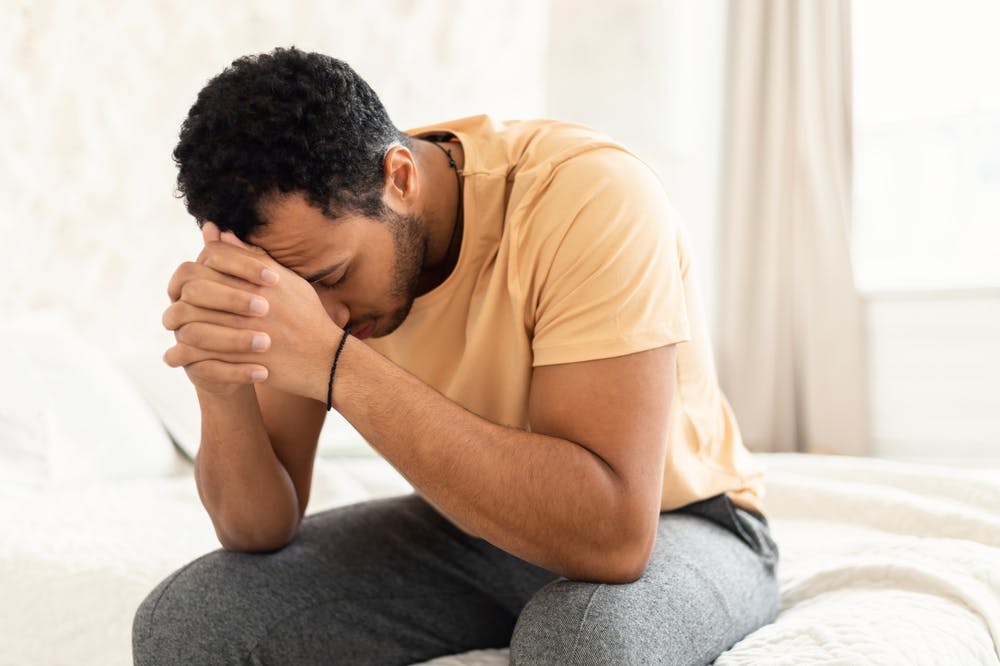In addition to persistent sadness and low moods or disinterest, other symptoms may indicate depression. Some of these symptoms include:
- loss of energy or persistent fatigue;
- increased meaningless physical activity (e.g. pacing, nail-biting) or noticeably slower speech or movement;
- trouble concentrating, thinking, or making decisions;
- oversleeping or irregular sleeping schedules;
- sudden weight loss or gain unrelated to dieting;
- overwhelming sense of guilt or shame; and
- intrusive thoughts of self-harm or suicide.
While not all of these symptoms need to be present for a person to be clinically depressed, it is important to recognise the persistence and duration of such symptoms in relation to the person’s mental and emotional health and wellbeing.[3]
Regarding ‘How To Know If You Have Depression?’ it is best to consult with a doctor. If you believe you or a loved one may be struggling with depression, please do not hesitate to reach out to Mosh.
We have a brief questionnaire to help with the initial assessment of your situation if you are feeling depressed about life. After we have received your form, we will connect you with one of our doctors for an initial consultation.
With Mosh’s help, you can be a step closer to safely answering ‘how to not be depressed‘ and safely coping with depression.
When you experience persistent sadness or low moods, there are coping strategies that help manage the symptoms of the disorder.[4]
Practice healthier habits.
Some studies have explored how unhealthy eating habits or poor lifestyle behaviours contribute to the symptoms of depression.[5] If you can, try cutting out the more unhealthy foods from your diet or exercising more regularly, and see if such activities help improve how you feel.
Establish a routine.
Routines are a great way to help yourself manage your symptoms, as they establish a pattern of behaviour you can rely on when you ‘auto-pilot’ through your day. Adding self-care reminders into your daily routine, such as reminders to eat, hydrate, and maintain your hygiene, can also greatly help with your mental health.[6]
Communicate with others.
One part of many therapies is learning how to constructively communicate what you feel or think about your situation or relationships. If there is someone you know with whom you can trust or safely speak openly, try reaching out to them.
Remember that you are not alone in what you feel.
There is no shame in asking for help with depression. If there is someone you can turn to for support, whether they are a trusted friend or a health professional, they may be able to help you through your journey towards better mental health.
The first step towards answering ‘how to not be depressed’ is acknowledging its presence in our daily lives. It is also important to understand that there is not a one-size-fits-all solution or cure for the disorder, and what works for one person may not be effective for another.
With that said, when it comes to how to treat depression, there are common treatments that help with managing the disorder and its symptoms. Connect with your doctor about what treatment plan may be suitable for you.
Counselling
While counselling and psychotherapy are often confused with one another with regard to dealing with depression, there are some differences between the two.
For instance, counselling is a talking therapy that focuses on helping you understand how you feel and what is causing you to feel the way you do.[7] In some instances, counselling may involve speaking to a therapist individually. There may also be group sessions, depending on what your doctor deems appropriate for your treatment.
Through your sessions, you may learn how to cope with stress or its effects, should stress be a contributing factor to your depression.
Psychotherapy
When people search for therapy concerning ‘how to not be depressed’, it is generally understood to be a form of psychotherapy. This is because psychotherapy is a broad medical field of treatment that can involve counselling, as well as other forms.
Some common examples of psychotherapy are cognitive behavioural therapy (CBT),[8] which aims to help you change behaviours that are negatively impacting your mental well-being, and art therapy,[9] which aims to help in processing or understanding trauma, negative emotions, or grief via creative exercises.
Prescription medication
Several medications are medically prescribed or approved for treating certain mental health issues or their symptoms, especially when combined with therapy.[10] Talk to your doctor if medication may be a recommended option for you.
Sleep aids, for example, may help alleviate mild irregular sleeping issues caused by depression or anxiety. Meanwhile, some prescription medications can help manage the symptoms of depression.
How to approach treatment
The key aspect of these treatments, especially in answering ‘how to not be depressed’, is working with your doctor’s advice and guidance.
When dealing with depression, it is important to work with your Mosh doctor and connect with them regarding your symptoms and current condition. Depending on your doctor’s advice and assessment of your unique needs, one or a combination of these treatments may be recommended to you.
Our aim at Mosh is to make personal health and care easier and more accessible beyond the four walls of a traditional clinic setting. We work with you because we understand that your time is as important as your health, and both are critical to staying healthy and happy.
Let us bring you closer to finding your answers to questions like ‘How To Deal With Depression’ or ‘What is chemical imbalance depression?’
Connect with a Mosh doctor whenever you’re ready.

